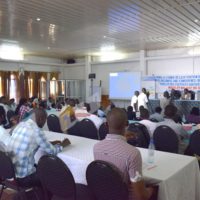Burundian Institute of Statistics and Economic Studies (ISTEEBU) in collaboration with UNFPA has organized a workshop this October 19 to publish the results of a survey jointly conducted on the demographic situation in Burundi. The workshop aimed to analyze the benefits that the country could get from a demographic transition.

Jean Pierre Guengant, UNFPA economic expert : “ with the prevalence of 20% of contraceptives use, a Burundian woman had an average of six children. Today, the average is probably low. It is estimated at 4.6 children per woman.”
Jean Pierre Guengant, a UNFPA economic expert explained that the demographic advantages the country may have imply the mastery of fertility and mortality data in a given economic condition and macro-economic framework.
According to the survey, the use of contraceptives has significantly increased in Burundi over the past 5 years. In 2010, about 20% of women used contraception methods. According to the National Health Reproduction Program (PNSR) data, today women who use these methods are about 40%. In 2010, with the prevalence of 20% of contraceptives use, a Burundian woman had an average of six children. Today, the average is probably low. It is estimated at 4.6 children per woman.
He reported that two-third of the Burundian population are below 25 years. They legitimately want to have children. If these young people are going to have only two children, it means that the birth rate will be high. Currently, we recorded 400,000 births in Burundi and 100,000 deaths, which means that there is an increase of 300,000 people every year. So, the population will continue to increase significantly until 2050. If Burundian women use contraceptive methods in 2050, there will be around 2 children per woman, which will give nearly 20 million people in Burundi.
That is to say, twice more than today because the Burundian population is currently estimated at 11 million. According to UN projection, if Burundian women using contraception methods were 50% or 60%, the Burundian population would be 25 million in 2050
Nicolas Ndayishimiye, the ISTEEBU Managing Director asks Burundian married couples to take serious measures to limit the number of births. He proposes the use of contraceptive methods. He requests the Burundian government to support the policy to significantly reduce the increase in population.
















 IWACU Open Data
IWACU Open Data

